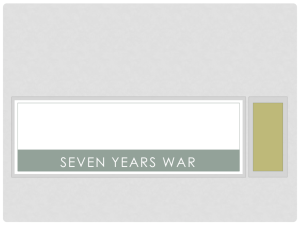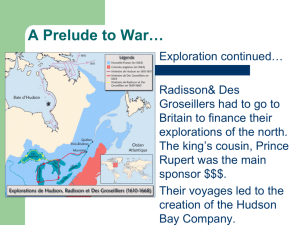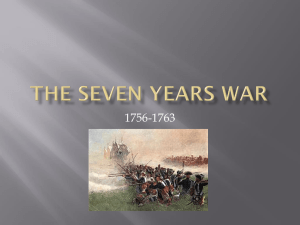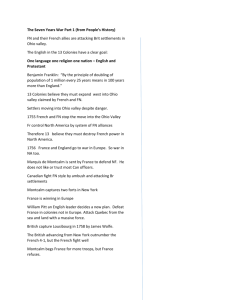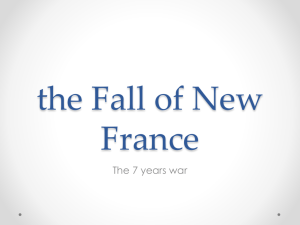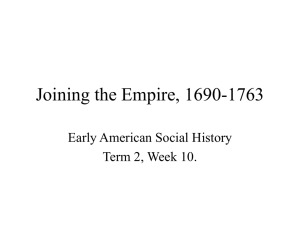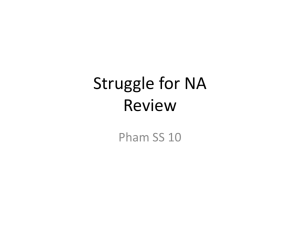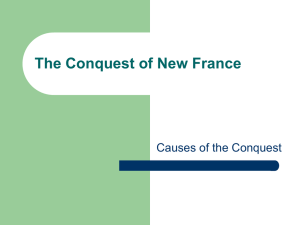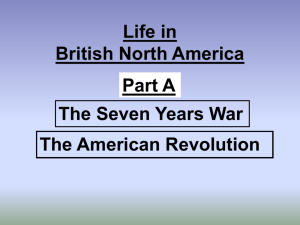Seven Years' War Notes
advertisement
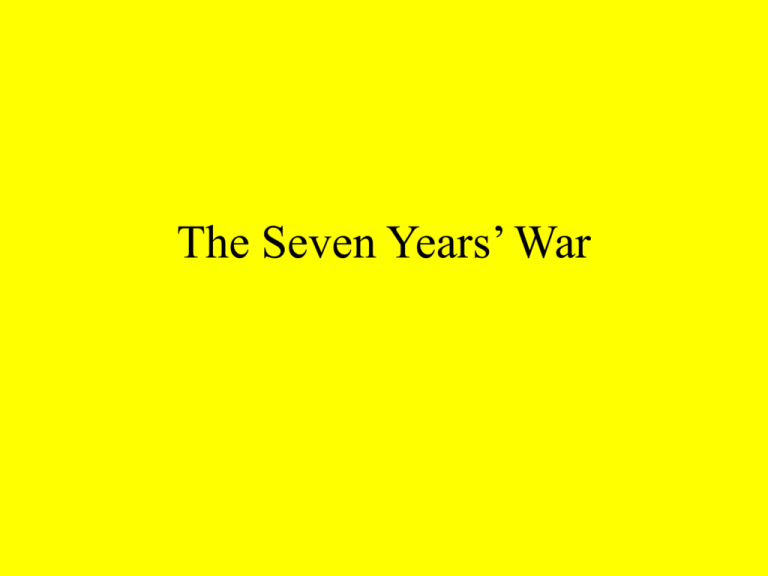
The Seven Years’ War 1750 • France and England are the two greatest powers in the world • France has a great army • England has a great navy • They are in direct competition in the Americas • Something has got to give 1750 1750 Cont… • Frontiers in North America were in dispute • Both sides laid claim to NS, Acadia and the Grand Banks • The area in dispute went south into modernday states of Pennsylvania and Louisiana • Peace talks in Europe amounted to nothing 1752-1753 • French attack Iroquois in the Ohio Valley who trade with the British • They set up garrisons and forts in the region • In October 1753, Major George Washington delivers orders to the French to leave • These orders are rejected 1754- This Means War! • The British begin attacking back • Battles ensue over the next few years • In 1755, Lt. Colonel Robert Monckton takes Fort Beausejour (near NS and Acadia) • This cut Louisbourg off from land-based reinforcements • It’s the beginning of the end for the French in NS The Great Upheaval • Took place from 1755-1763 • After taking Fort Beausejour, the English do not trust the Acadians • Acadians speak French, but claim they are a separate nation from France and have no alliance with the French • The English try to get them to swear an oath of loyalty to England Upheaval Cont… • Acadians want to remain neutral and do not wish to swear an oath to anyone • The English then begin the expulsion • Acadians are forcibly removed from their homes • Families are split up and relocated all across the continent • This is one of the biggest disgraces of our history 1756- Europe • 1756- War breaks out (Seven Years’ War) • England and Prussia against France, Austria, Russia, and others • This is considered the first “global war” • France concentrates most of its troops to Europe leaving fewer troops in the Americas • Prussia has a great army, so England is free to send more troops to colonies 1758- Louisbourg • This is the last great French fort East of Quebec. It could: – Help re-supply Quebec forts – Launch attacks upon the British on the St. Lawrence – Nearest outpost to France • It had to go if Britain wanted to win Louisbourg Cont… • May 1758- British Naval forces leave Halifax for the attack • There are nearly 200 ships and 14,000 men • By June 25th the entire French Navy at Louisbourg is destroyed • One month later (26-July) Louisbourg fell to the British • This ended French power in Atlantic Canada The Plains of Abraham • With Louisbourg gone the French power resided in Quebec • On Sept. 13, 1759 the British attack • Brits are led by Major-General James Wolfe • French led by Lt. General the Marquis de Montcalm Plains cont… • There are cliffs to one side of the plains which were unfortified • Montcalm did not think anyone could climb them…but Wolfe’s men did • Surprised, Montcalm attacked quickly • Each side had approx. 4500 men Plains Cont… • The English troops were regulars, but the French were largely militia • The fight was short, but both Wolfe and Montcalm were mortally wounded • Wolfe was shot in the chest and stomach • As he was lying on the field he watched the French retreating. He gave orders to his men to give chase, then died • Montcalm died the next morning of a stomach wound Signal Hill- 1762 • By now the French and English have been fighting for about 8 years • Earlier in the year the French took St. John’s • The British want it back to keep control of the fisheries • Sept. 15 at dawn, the British launch a surprise attack on Signal Hill Signal Hill Cont… • The surprise worked and the French were defeated easily • With this position fortified St. John’s was ceded by the French 3 days later • This was the final battle of the Seven Year’s War in the Americas Result- Treaty of Paris • The Treaty of Paris was signed Feb. 10, 1763 • England gained all the French territory in Canada and east of the Mississippi • French settlements in Quebec were given rights to remain as a distinct society • This formed the basis for Quebec’s special position today
